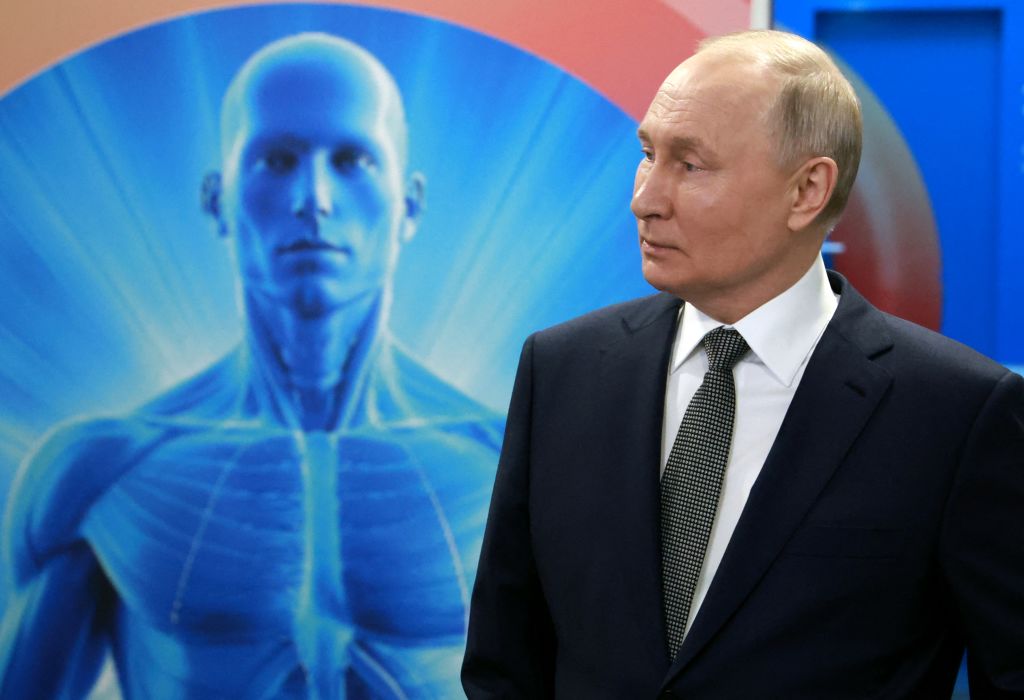Living forever has long had an image problem. In the popular mind, it is the property of creepy Silicon Valley “transhumanists” such as Bryan Johnson; the stuff of bad sci-fi startups like Ambrosia, which literally milked the blood of the young to give to the old. But what if anti-ageing was rebranded as a great act of patriotism — as a kind of moonshot? John F. Kennedy’s Apollo programme, after all, went on to inspire Richard Nixon’s war on cancer.
Other than the war in Ukraine, eternal youth seems to be the Kremlin’s main mission. It has been reported that a close ally of Vladimir Putin, Mikhail Kovalchuk, is pushing Russian scientists with ever more urgency to learn how to stop the ageing process.
Back in February, on Valentine’s Day to be precise, Putin personally announced a new “national mission” for Russia in life-extension technologies. Deputy Prime Minister Tatyana Golikova then fleshed out the plan months later. The state, she said, would be making investments in “technology that prevents cellular ageing, neurotechnologies, and other innovations aimed at ensuring longevity”.
Why, in the middle of a war threshing through its young men, is Russia seemingly turning its eyes to protecting the collagen of its Boomers? Latter-day Kremlinologists are struggling to piece together the answer, but in January of this year Putin’s longstanding anti-ageing guru Vladimir Khavinson suddenly failed in his mission to live to 100. The 77-year-old had been the director of the St Petersburg Institute of Bioregulation and Gerontology. The anti-ageing “Khavinson peptides” which he invented did not produce good results in supervised medical trials, yet over many years they were doled out to a wide range of Russian athletes and soldiers — and even to Putin’s “secret wife”, 41-year-old Alina Kabaeva.
Khavinson had argued that the population should be injected twice yearly with “a natural medication extracted from calves”, and claimed that his discoveries were “as important as the development of the atomic bomb”. His obsession lives on in the person of Kovalchuk, who now oversees Russia’s genetic research programme. Kovalchuk’s labs also employ Putin’s eldest daughter, the endocrinologist Maria Vorontsova.
There may be more immediate reasons for this research, as rumours still circulate about the health of the Russian President. His inner core of political allies and generals are not exactly as geriatric as their American counterparts — but with an average age in the early 70s, they’re getting on.
Russia has been making progress in its life science and technology industries. In 2018, a Russian startup called 3D Bioprinting Solutions became the first in the world to print human cartilage tissue, as well as a mouse thyroid gland. Though its founder fled the country at the outbreak of the Ukraine War, Russian authorities still insist they will have the technology for printing “complex human organs” ready within six years. But the truth about anti-ageing is that there are few silver bullets, because ageing is effectively a disease-of-the-everything. Bar a mechanical meat-swap future of fully-fledged organ printing where you can replace individual parts of the body like Theseus’s ship, progress will always be gradual.
Of course, there is also a Promethean curse attached to winning this particular race. One of the reasons Russia has been able to sustain its balance sheet so well in modern times is that, unlike their Western counterparts, Russian men still maintain the public-spirited habit of dropping dead at an average age of 67. You don’t get to their startlingly low 18.9% debt-to-GDP ratio without that.
The Russian population pyramid is already inverted, like many in the West, at 1.49 births per woman. Whatever the economic or moral benefits of achieving immortality, the pension liabilities would rapidly drain the coffers. A better national mission might be looking into the traditional cellular rejuvenation technology called “babies”. It might also be better for the national image.











Join the discussion
Join like minded readers that support our journalism by becoming a paid subscriber
To join the discussion in the comments, become a paid subscriber.
Join like minded readers that support our journalism, read unlimited articles and enjoy other subscriber-only benefits.
Subscribe